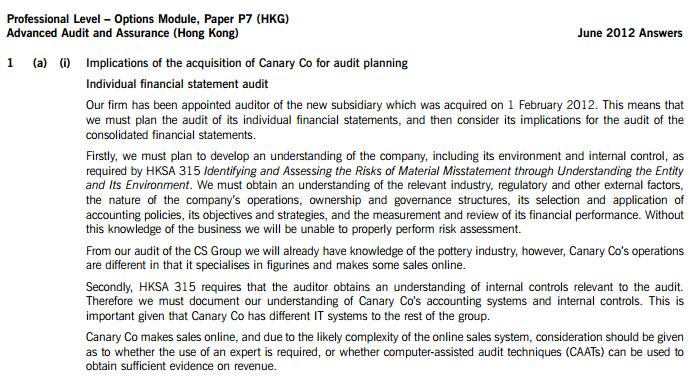
It will take time to gain this knowledge and to properly document it. Given that the company’s year end is less than one
month away, it is important that we plan to begin this work as soon as possible, to avoid any delay to the audit of either
the individual or the consolidated financial statements. We need to arrange with the client for members of the audit team
to have access to the necessary information, including the accounting system, and to hold the necessary discussions
with management. Once we have gained a thorough understanding of Canary Co we will be in a position to develop an
audit strategy and detailed audit plan.
We have been provided with the CS Group’s forecast revenue and profit for the year, but need to perform a detailed
preliminary analytical review on a full set of Canary Co’s financial statements to fully understand the financial
performance and position of the company, and to begin to form a view on materiality. This review will also highlight any
significant transactions that have occurred this year.
As this is an initial audit engagement, we are required by HKSA 300 Planning an Audit of Financial Statements to
communicate with the predecessor auditor. If this has not yet occurred, we should contact the predecessor auditor and
enquire regarding matters which may influence our audit strategy and plan. We may request access to their working
papers, especially in respect of any matters which appear contentious or significant. We should also review the prior
year audit opinion as this may include matters that impact on this year’s audit.
As the opening balances were audited by another firm, we should plan to perform additional work on opening balances
as required by HKSA 510 Initial Audit Engagements – Opening Balances.
Consolidated financial statements audit
As Canary Co will form a component of the consolidated financial statements on which we are required to form an
opinion, we must also consider the implications of its acquisition for the audit of the CS Group accounts. HKSA 600
Special Considerations – Audits of Group Financial Statements (Including the Work of Component Auditors) requires
that the group auditor must identify whether components of the group are significant components. Based on the forecast
results Canary Co is a significant component, as it represents 11·9% of forecast consolidated revenue, and 23·5% of
forecast consolidated profit before tax.
As our firm is auditing the individual financial statements of Canary Co, our risk assessment and planned response to
risks identified at individual company level will also be relevant to the audit of the consolidated financial statements.
However, we must also plan to obtain audit evidence in respect of balances and transactions which only become relevant
on consolidation, such as any inter-company transactions that may occur.
A significant matter which must be addressed is that of the different financial year end of Canary Co. We will have
audited Canary Co’s figures to its year end of 30 June 2012, but an additional month will be consolidated to bring the
accounts into line with the 31 July year end of the rest of the CS Group. Therefore, additional procedures will have to
be planned to gain audit evidence on significant events and transactions of Canary Co which occur in July 2012. This
may not entail much extra work, as we will be conducting a review of subsequent events anyway, as part of our audit
of the individual financial statements.
It may be that Canary Co’s year end will be changed to bring into line with the rest of the CS Group. If so, we need to
obtain copies of the documentary evidence to demonstrate that this has been done.14
When performing analytical procedures on the consolidated financial statements, we must be careful that when
comparing this year’s results with prior periods, we are making reasonable comparisons. This is because Canary Co’s
results are only included since the date of acquisition on 1 February 2012 and comparative figures are not restated.
Calculations such as return on capital employed will also be distorted, as the consolidated statement of financial position
at 31 July 2012 includes Canary Co’s assets and liabilities in full, but the consolidated income statement will only
include six months’ profit generated from those assets.
Materiality needs to be assessed based on the new, enlarged group structure. Materiality for the group financial
statements as a whole shall be determined when establishing the overall group audit strategy. The addition of Canary
Co to the group during the year is likely to cause materiality to be different from previous years, possibly affecting audit
strategy and the extent of testing in some areas.
Finally, we must ensure that sufficient time and resource is allocated to the audit of the consolidated financial statements
as there will be additional work to perform on auditing the acquisition itself, including the goodwill asset, the fair value
of assets acquired, the cash outflows, the contingent consideration, and the notes to the financial statements. As this is
a complex area we should consider allocating this work to a senior, experienced member of the audit team. Relevant
financial statement risks and audit procedures in respect of goodwill are discussed later in these notes.